People
People
Understanding complex social problems is easier when data scientists, social scientists, humanists, and other difference makers can be assembled around the same table. It also means drawing from diverse methods, theories, and perspectives.
At the Cline Center for Advanced Social Research, we’re building an innovative community of scholars who not only pursue collaborative text analytics research using our data, software, and expertise, but are deeply invested in promoting societal well-being. The Cline Center affiliates network includes faculty, students, and staff from six colleges at the University of Illinois at Urbana-Champaign and from collaborating institutions spread across five continents.
The Cline Center is a collaborative enterprise that draws faculty, staff, students, and difference-makers from the public and private sectors into interdisciplinary research projects that address real-world problems. Core staff and faculty members working in our Research Park location manage day-to-day operations involving faculty fellows, graduate fellows, research assistants, interns, and analysts. We also support collaborative projects through our network of faculty and research affiliates spanning the Urbana-Champaign campus as well as other institutions across the globe.
Here’s who is making a difference with the Cline Center.

Director Scott Althaus joined the University of Illinois faculty in 1996 with a joint appointment in the departments of Political Science and Communication. He is currently the Charles J. and Ethel S. Merriam Professor of Political Science and Professor of Communication at the University of Illinois. He is also a faculty affiliate of the School of Information Sciences, the National Center for Supercomputer Applications, the Illinois Informatics Institute, and the Institute for Computing in the Humanities and Social Sciences. Professor Althaus's research and teaching interests explore the communication processes that support political accountability in democratic societies and that empower political discontent in non-democratic societies. His interests focus on four areas of inquiry: (1) how journalists construct news coverage about public affairs, (2) how leaders attempt to shape news coverage for political advantage, (3) how citizens use news coverage for making sense of public affairs, and (4) how the opinions of citizens are communicated to leaders through collective preferences, such as the results of opinion polls, and through collective behaviors, such as civil unrest. He has particular interests in popular support for war, data science methods for extreme-scale analysis of news coverage, cross-national comparative research on political communication, the psychology of information processing, and communication concepts in democratic theory. Professor Althaus serves on the editorial boards of Critical Review, Human Communication Research, Journal of Communication, Political Communication, and Public Opinion Quarterly. His research has appeared in the American Political Science Review, the American Journal of Political Science, Communication Research, Journalism and Mass Communication Quarterly, Journal of Broadcasting & Electronic Media, Journal of Conflict Resolution, Journal of Politics, Public Opinion Quarterly, and Political Communication. His book on the political uses of opinion surveys in democratic societies, Collective Preferences in Democratic Politics: Opinion Surveys and the Will of the People (Cambridge University Press, 2003) , was awarded a 2004 Goldsmith Book Prize by the Joan Shorenstein Center on the Press, Politics and Public Policy at Harvard University, and a 2004 David Easton Book Prize by the Foundations of Political Theory section of the American Political Science Association. He was named 2014-15 Faculty Fellow at the National Center for Supercomputing Applications at UIUC, a 2004-5 Beckman Associate by the UIUC Center for Advanced Studies, and a 2003-4 Helen Corley Petit Scholar by the UIUC College of Liberal Arts and Sciences. In 2013, he was honored with a Dean's Award for Excellence in Undergraduate Teaching from the College of Liberal Arts and Sciences at UIUC, and his undergraduate and graduate courses regularly appear on the university's "List of Teachers Ranked as Excellent by Their Students.
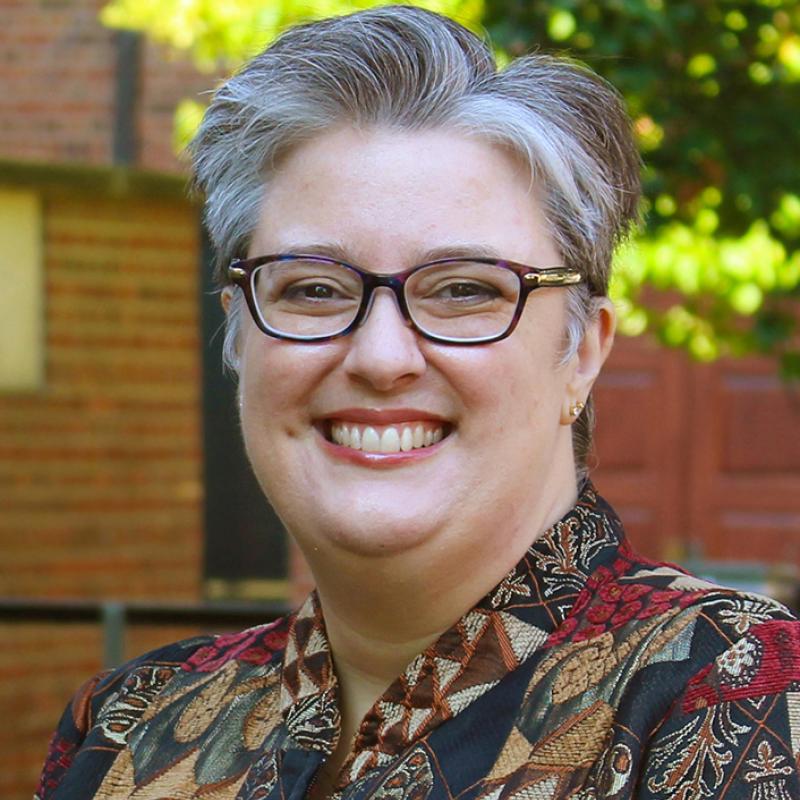
Catherine Blake is an associate professor in the School of Information Sciences at the University of Illinois at Urbana-Champaign with affiliate appointments in the Department of Computer Science and the Department of Medical Information Science. At the iSchool, she serves as associate director of the Center for Informatics Research in Science and Scholarship and is an active member of the Socio-technical Data Analytics group.
Her primary research goal is to accelerate scientific discovery by synthesizing evidence from text. Her techniques embrace both automated and human approaches that are required to resolve contradictions and redundancies that are inevitable in an information-intensive world.
Blake earned master’s and doctoral degrees in information and computer science at the University of California, Irvine and bachelor’s and master’s degrees in computer science at the University of Wollongong.
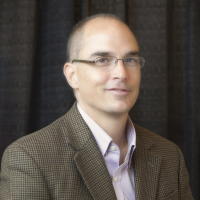
Robert J. Brunner is a professor in the School of Information Sciences and in the Department of Accountancy in the Gies College of Business. He has affiliate appointments in the Astronomy, Computer Science, Electrical and Computer Engineering, Informatics, Physics, and Statistics Departments; at the Beckman Institute, in the Computational Science and Engineering program; and at the National Center for Supercomputing Applications. He is also the Data Science Expert in Residence at the Research Park at the University of Illinois.
His primary research goal focuses on the application of statistical and machine learning to a variety of real-world problems, and in making these efforts easier, faster, and more precise. This work spans fundamental algorithm design to more effectively incorporate uncertainty to optimization using novel computational technologies. More generally, Brunner helps lead efforts to promote data science across campus and to encourage effective data management, analysis, and visualization techniques.
Brunner earned his PhD in astrophysics at the Johns Hopkins University working under Alex Szalay on the development of the science archive for the Sloan Digital Sky Survey. His PhD thesis helped develop the statistical approach to quantifying galaxy evolution, where large data are used to place constraints on the original and evolution of the Universe. He subsequently spent five years as a postdoctoral scholar at the California Institute of Technology working under S. George Djorgovsi and Tom Prince as the project scientist for the Digital Sky project.
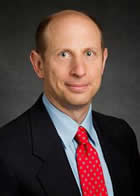
Dov Cohen has been a faculty member at the University of Illinois and the University of Waterloo in Canada. He is currently professor of psychology with affiliations in the College of Law and the Center for East Asian and Pacific Studies. He is the co-author or co-editor of the books: Handbook of Cultural Psychology, Culture of Honor, and Culture and Social Behavior. Among other topics, he has done research on culture; religion; language use; concepts of face, dignity, and honor; violence; and legal policy and practice.
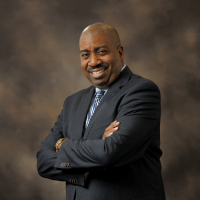
Travis Dixon is a media effects scholar dedicated to investigating the prevalence of stereotypes in the mass media and the impact of stereotypical imagery on audience members. He has been honored as a faculty fellow with UIUC's Center on Democracy in a Multiracial Society and he was the 2013 Visiting Philanthropy Faculty Scholar at the Clinton School of Public Service. Dr. Dixon has received 7 top paper awards from the National Communication Association and the International Communication Association. He has also received a top article award from the National Communication Association. Dr. Dixon serves on the editorial boards of the Journal of Communication, Communication Research, Howard Journal of Communications, Media Psychology, and the Journal of Broadcasting & Electronic Media. Much of Dr. Dixon's work has been focused on racial stereotyping in television news. His more recent investigations examine the content and effects of stereotypes and counter-stereotypes in major news events, online news, and musical
contexts.
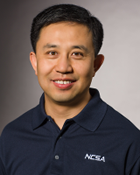
Shaowen Wang is a Professor of Geography and Geographic Information Science (Primary), Computer Science, Library and Information Science, and Urban and Regional Planning at the University of Illinois at Urbana-Champaign (UIUC), where he is named a Centennial Scholar in the College of Liberal Arts and Sciences. He is also Associate Director for CyberGIS and a Senior Research Scientist of the National Center for Supercomputing Applications (NCSA), and Founding Director of the CyberGIS Center for Advanced Digital and Spatial Studies and CyberInfrastructure and Geospatial Information Laboratory. He holds affiliate appointments within UIUC’s Computational Science and Engineering Graduate Program and Illinois Informatics Institute. He received his BS in Computer Engineering from Tianjin University in 1995, MS in Geography from Peking University in 1998, and MS of Computer Science and PhD in Geography from the University of Iowa in 2002 and 2004 respectively. His research and teaching interests center on three interrelated themes: 1) computational and geographic information sciences; 2) advanced cyberinfrastructure, cyberGIS, and geospatial data science; and 3) multi-scale geospatial problem solving and spatiotemporal analytics. His research has been actively supported by multiple US government agencies and industry. He has published a number of peer-reviewed papers including articles in more than 15 journals. He has served as an Action Editor of GeoInformatica, and guest editor or editorial board member for seven other journals, book series and proceedings. He is serving as the President of the International Association of Chinese Professionals in Geographic Information Sciences. He served on the University Consortium for Geographic Information Science Board of Directors from 2009 to 2012, and was appointed two terms as a Councilor of the Open Science Grid Consortium. He was a visiting scholar at Lund University sponsored by the National Science Foundation (NSF) in 2006 and NCSA Fellow in 2007, and received the NSF CAREER Award in 2009.
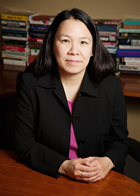
Cara Wong is Associate Professor of Political Science and of Asian American Studies. Wong is author of Boundaries of Obligation in American Politics (2010, Cambridge University Press), and she has published numerous articles in edited volumes and journals, including the Journal of Politics, British Journal of Political Science, Public Opinion Quarterly, and Political Behavior. Her work has been supported by grants from the National Science Foundation, Carnegie Corporation, Social Science and Humanities Research Council of Canada, University of Michigan, and University of Illinois. Wong holds a Ph.D. from the University of California, Berkeley, and her areas of specialization are public opinion and political behavior; political psychology; race and ethnicity; and citizenship and immigration.

Robert Lawless is the Max L. Rowe Professor of Law and co-director of the Program on Law, Behavior and Social Science. He served as the College's associate dean for research from 2013-16.
Lawless specializes in bankruptcy, consumer credit, and business law. He is a new co-author for the eighth edition of Secured Transactions: A Systems Approach, a leading textbook on secured transactions. He also joins Professors Jennifer K. Robbennolt and Thomas S. Ulen as the co-author of Empirical Methods in Law, a textbook on empirical methodologies as applied to the study of law and newly released in a second edition in 2016.
Professor Lawless administers and contributes to the blog Credit Slips, a discussion on credit, finance, and bankruptcy. He also participates in the Consumer Bankruptcy Project, a long-term research project studying persons who file bankruptcy. Professor Lawless is a member of the American Law Institute, the National Bankruptcy Conference, and the American College of Bankruptcy. He has testified before Congress, and his work has been featured in media outlets such as CNN, CNBC, NPR, the New York Times, the Wall Street Journal, USA Today, the National Law Journal, the L.A. Times, and the Financial Times. Professor Lawless is also one of the College's regular contributors to Legal Issues in the News on WILL-AM 580.
A native Illinoisan, Professor Lawless earned both his undergraduate degree in accounting and his law degree from the University of Illinois. During law school, he served as editor-in-chief of the University of Illinois Law Review. Prior to joining the Illinois faculty in 2006, Professor Lawless was the Gordon & Silver, Ltd., Professor of Law at the University of Nevada-Las Vegas William S. Boyd School of Law. From 1993 to 2002, he was on the faculty at the University of Missouri-Columbia School of Law, and he has been a visiting faculty member at the University of Illinois, Ohio State University, and Washington University in St. Louis. Professor Lawless began his career as a law clerk for the Honorable Harlington Wood, Jr., of the United States Court of Appeals for the Seventh Circuit and then practiced law in Washington, D.C., with the firm of Zuckert, Scoutt & Rasenberger.

Ruby Mendenhall is an Associate Professor at the University of Illinois, Urbana-Champaign. She holds joint faculty appointments in Sociology, African American Studies, Urban and Regional Planning, and Social Work. She is currently a Faculty member at the Carl R. Woese Institute for Genomic Biology and a Faculty Affiliate at the Institute for Computing in the Humanities, Arts and Social Sciences, Women and Gender in Global Perspective, and Gender and Women Studies. She is the recipient of the Richard and Margaret Romano Professorial Scholar for outstanding achievements in research and leadership on campus. She is also a Grand Challenge Learning Teaching Fellow in the Health Track. Mendenhall’s research focuses on racial microaggressions in higher education. She examines how living in racially segregated neighborhoods with high levels of violence affects Black mothers’ mental and physical health using qualitative, quantitative and genomic analysis. She is attempting to recover Black women’s lost history by using topic modeling and data visualization to examine over 800,000 documents from 1740 to 2014. Mendenhall also does research on racial microaggressions and the Earned Income Tax Credit (EITC). She teaches the following courses: Research Methods; Social Stratification; Urban Communities and Public Policy; Black Women in Contemporary U.S. Society; Genes and Behavior: Black Mothers in Englewood from Science to Society; and Stress and Health in Urban Communities. Her research has appeared in academic journals such as Social Forces, Social Science Research, Demography, Housing Policy Debate, The Review of Black Political Economy, The Black Scholar, and Social Service Review.

